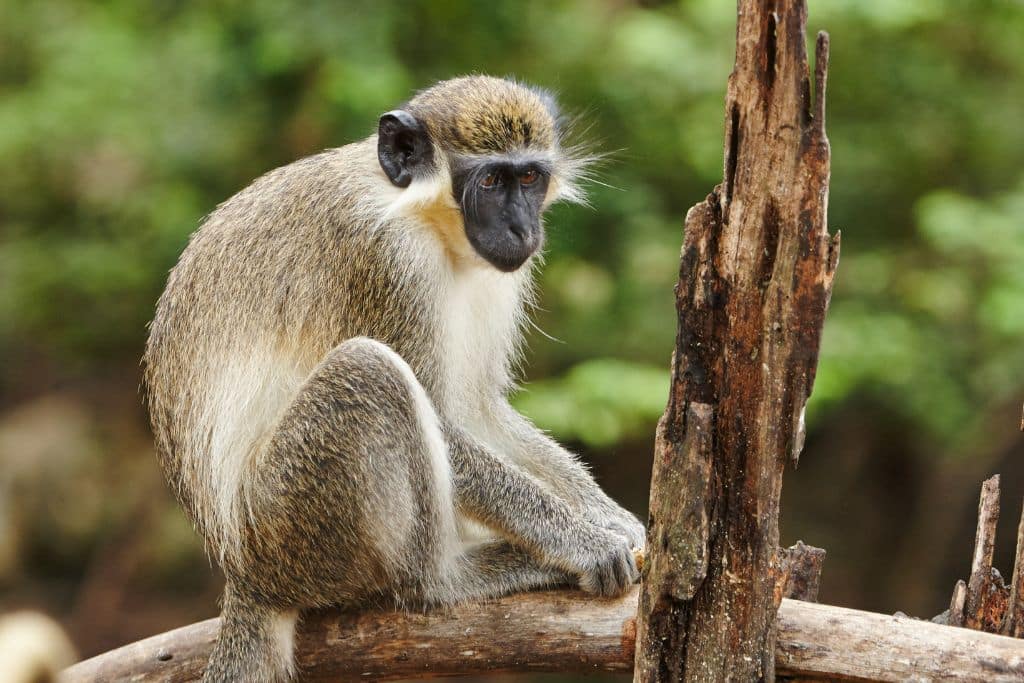In January of this year, news reports circulated about the proposed cull of around 450 monkeys on the Dutch island territory of St. Maarten in the Caribbean. The decision to kill the monkeys was based on research carried out by a local non-profit, the Nature Foundation, which erroneously predicted that the monkey population was set to double in one year. The subsequent publicity led to international concern and calls for the monkey cull to be abandoned in favour of non-lethal control of the non-native primates.
—
By Liz Tyson-Griffin, PhD, Born Free USA Programs Director
In light of the news, global wildlife protection non-profit, Born Free USA, coordinated a group of 75 primatologists, veterinarians, and animal welfare experts and organisations to lead the call for St. Maarten to adopt a humane sterilisation programme in place of the planned killing.
The coalition sent a letter to the St. Maarten government on February 2, 2023, but received no response from officials. On March 2, in a bid to increase pressure, a public petition was launched to show support for the proposed sterilisation programme. To date, more than 2,500 compassionate people have signed it.
In the detailed letter sent to the government, the coalition raised concerns over the quality of the research upon which the decision to execute the monkey cull was based. Breaking the issues down, the groups noted the following points.
1. Population Growth Figures Are Wildly Inaccurate
Aside from questions arising over the true number of monkeys on the island, with some primatologists working in the region casting doubt over the accuracy of the Nature Foundation’s census, the report’s claims over potential population growth were rejected.
The Nature Foundation document claims that the estimated 450-strong population could double in size in the space of 12 months. The coalition letter stated that this “shows a disturbing lack of understanding of primate behavior and reproduction.” Indeed, calculations carried out by Born Free USA based on population growth over time estimate that monkey numbers may grow by 10% per year, not 100% as claimed by the Nature Foundation. This, they say, means that there is no urgent need to eradicate the monkeys and rather there is time to implement humane non-lethal control before numbers get out of hand.
2. Cost Analysis Is Unsubstantiated
The Nature Foundation report claims that monkeys’ sterilisation would cost five times more than what it would cost to kill them, however, there is no information available to substantiate this claim. The coalition in favor of sterilization has asked the St. Maarten government to provide a cost analysis and to allow the coalition to re-cost the project. With veterinarians standing by to offer training and expertise, there is no reason for sterilisation to be more expensive than the proposed monkey cull.
3. Public Survey Flawed
The Nature Foundation points to a public survey as a means to demonstrate public support for the monkey cull but results are misleading. Indeed, some information provided to respondents, and upon which their responses were based, were incorrect.
The survey included the claim that sterilisation would cost five times more than culling, which is unsubstantiated. It also cited that there was a “risk of failure” if sterilisation was chosen but not if killing was chosen to control the monkey population. Again, no evidence was provided to support this claim. Indeed, as both methods require the trapping of monkeys, the risk of failure is arguably equal in both cases.
Interestingly, 72% of survey respondents self-identified as involved in agriculture whereas more than 85% of island residents are employed in tourism and just 1% of the country’s GDP comes from agriculture. As such, it appears that survey respondents were not representative of the wider population and the majority of respondents were people most likely to be biased toward lethal control. That being said, there was only a small majority of people who favoured killing over either doing nothing or sterilising the monkeys (55% and 45%, respectively). So, even with misleading information, the public survey can hardly be considered decisive.
Next Steps
Monkeys on the island territory may not be native, but they have co-existed alongside the human population for decades and perhaps even centuries. Likely growing from a founder population of escaped or released former pet monkeys, their presence on the island is no fault of their own and they do not deserve to be killed.
As a country that relies on tourism, killing innocent animals may lead to backlash and affect the local economy. Instead, St. Maarten has the opportunity to establish a humane and effective population control project, which can lead the way for other islands in the region to follow.
Born Free USA is calling upon members of the public to abandon the monkey cull and encourage St. Maarten officials to collaborate with experts to come up with a better plan, which mitigates the nuisance caused by the monkeys without resorting to mass slaughter.
You can help efforts by signing the petition here.
—
About the Author:
Dr. Liz Tyson-Griffin is Born Free USA’s Programs Director. She has helped animals across the globe. She helped to establish the very first locally-run sterilisation program for street dogs in the Middle East; worked with indigenous communities in the Colombian Amazon to end the hunting of wild primates; ran a UK charity campaigning to end the exploitation of animals in circuses and zoos; and helped design a new rehabilitation complex for rescued monkeys at Born Free’s sanctuary in Ethiopia, Ensessa Kotteh. In 2018, she earned her doctorate in Animal Welfare Law.
Liz recently published her book, Licensing Laws and Animal Welfare: The Legal Protection of Wild Animals, with Palgrave MacMillan/Springer Nature. The book outlines the findings of her doctoral research, which is the most comprehensive study of the legal protection of wild animals in English zoos carried out to date.
You might also like: Animal Captivity Is A Dangerous Distraction from Real Conservation Efforts


















